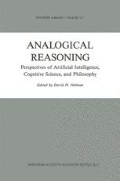Abstract
In this chapter l discuss the relative merits of the logical and similaritybased approaches to reasoning by analogy. Although recent work by Davies and the author has shown that, given appropriate background knowledge, analogy can be viewed as a logical inference process, I reach the conclusion that pure similarity can provide a probabilistic basis for inference, and that, under certain assumptions concerning the nature of representation, a quantitative theory can be developed for the probability that an analogy is correct as a function of the degree of similarity observed. This theory also accords with psychological data (Shepard), and together with the logical approach promises to form the basis for a general implementation of analogical reasoning.
Access this chapter
Tax calculation will be finalised at checkout
Purchases are for personal use only
Preview
Unable to display preview. Download preview PDF.
References
Anderson, R. O. (1969), ‘Conclusive analogical argument’, Revue Internationale de Philosophie 23: 44–57.
Carnap, Rudolf (1971), ‘A basic system of inductive logic, Part I’, in Carnap R. and Jeffrey, R. C. (eds.), Studies in Inductive Logic and Probability, Vol. I. Berkeley, CA: University of California Press.
Davies, Todd (1985), Analogy. Informal Note No. IN-CSLI-85–4, Center for the Study of Language and Information, Stanford University.
Davies, Todd and Russell, Stuart (1987), ‘A logical approach to reasoning by analogy’, in Proceedings of the Tenth International Joint Conference on Artificial Intelligence, Milan, Italy.
Dietterich, Thomas G. (1986), Learning at the Knowledge Level, Technical Report No. 86–30–1, Computer Science Department, Oregon State University.
Greiner, Russell (1985), Learning by Understanding Analogies, PhD thesis. Technical Report no. STAN-CS-85–1071. Stanford University.
Hesse, Mary (1966), Models and Analogies in Science, Notre Dame, Indiana: University of Notre Dame Press.
Keynes, John Maynard (1957), A Treatise on Probability, London: Macmillan.
Lenat, D., Prakash, M., and Shepherd, M. (1986), ‘CYC: Using common sense knowledge to overcome brittleness and knowledge acquisition bottlenecks’, AI Magazine 6, No. 4.
Mill, J. S. (1843), System of Logic, Book III, Ch. XX ‘Of Analogy’ in Vol. VIII of Collected Works of John Stuart Mill, University of Toronto Press; 1973.
Nagel, Ernest (1961), The Structure of Science, New York: Harcourt, Brace and World.
Ortony, A. (1979), ‘Role of similarity in similes and metaphors’, in Ortony, A. (ed.), Metaphor and Thought, Cambridge: Cambridge University Press.
Russell, Stuart J. (1986a), ‘Preliminary steps toward the automation of induction’, in Proceedings of the National Conference on Artificial Intelligence, Philadelphia, PA: AAAI.
Russell, Stuart J. (1986b), ‘A quantitative analysis of analogy by similarity’, in Proceedings of the National Conference on Artificial Intelligence, Philadelphia, PA: AAAI.
Russell, Stuart J. (1986c), Analogical and Inductive Reasoning, PhD thesis, Stanford University.
Shepard, R. N. (1958), ‘Stimulus and response generalization: Deduction of the generalization gradient from a trace model’, Psychological Review 65.
Shepard, R. N. (1962), ‘The analysis of proximities: Multidimensional scaling with an unknown distance function (Parts I and II)’, Psychometrika 27.
Shepard, Roger (1981), APA Division 3 Presidential Address, Los Angeles, August 25.
Shepard, R. N. (1984), ‘Similarity and a law of universal generalization’. Paper presented at the annual meeting of the Psychonomic Society, San Antonio, TX.
Tversky, Amos (1977), ‘Features of similarity’, Psychological Review 84, No. 4.
Uemov, A. I. (1964), ‘The basic forms and rules of inference by analogy’, in Tavanec, P. (or Tavanets) (ed.), Problems of the Logic of Scientific Knowledge, Dordrecht: D. Reidel; 1970. Translated from the Russian by T. J. Blakeley; Moscow: Nauka.
Utgoff, P. E. (1984), Shift of Bias for Inductive Concept Learning. PhD thesis, Rutgers University.
Winston, Patrick H. (1978), ‘Learning by creating and justifying transfer frames’, Artificial Intelligence 10 No. 4.
Author information
Authors and Affiliations
Editor information
Editors and Affiliations
Rights and permissions
Copyright information
© 1988 Springer Science+Business Media Dordrecht
About this chapter
Cite this chapter
Russell, S. (1988). Analogy by Similarity. In: Helman, D.H. (eds) Analogical Reasoning. Synthese Library, vol 197. Springer, Dordrecht. https://doi.org/10.1007/978-94-015-7811-0_12
Download citation
DOI: https://doi.org/10.1007/978-94-015-7811-0_12
Publisher Name: Springer, Dordrecht
Print ISBN: 978-90-481-8450-7
Online ISBN: 978-94-015-7811-0
eBook Packages: Springer Book Archive

